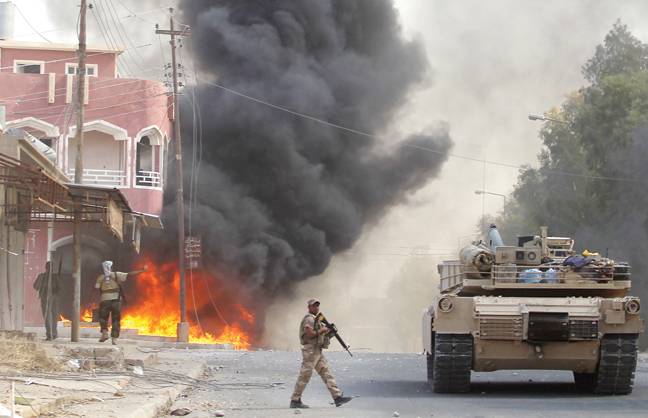TAL AFAR - Iraqi forces announced Saturday the ouster of Islamic State group militants from central Tal Afar and its historic citadel, leaving them poised to fully recapture one of the last IS urban strongholds in the country.
The advance, less than a week into an assault on the strategic city, comes after Prime Minister Haider al-Abadi declared victory in July over the militants in Iraq’s second city Mosul, where IS declared its “caliphate” in 2014.
“Units of the Counter-Terrorism Service liberated the Citadel and Basatin districts and raised the Iraqi flag on top of the citadel,” operation commander General Abdulamir Yarallah said in a statement.
The CTS and federal police units had also seized three northern districts and the Al-Rabia neighbourhood west of the citadel, after having retaking the district of Al-Taliaa to the south on Friday.
Clashes were ongoing on the northern outskirts and Iraqi forces were dealing with final pockets of militants inside the city, Yarallah said.
Columns of smoke could be seen rising over the city after the Hashed al-Shaabi paramilitary coalition fighting alongside government troops seized the Al-Khadra and Al-Jazeera districts. Abbas Radhi, a Hashed al-Shaabi fighter, said IS had resisted the advance mostly with sniper fire. “There are also booby-trapped cars, mortars. But they’ve been defeated, God willing,” he said.
Government troops and units of the Hashed al-Shaabi, backed by a US-led coalition against IS, launched the assault last Sunday after weeks of coalition and Iraqi air strikes. Tal Afar sits on a strategic route between IS-controlled territories in Syria and Mosul, 70 kilometres (40 miles) further east. Progress in Tal Afar has been far more rapid than in Mosul, which only fell to Iraqi forces after a gruelling nine-month battle.
Officials have said they hope to announce victory in Tal Afar by Eid al-Adha, the Muslim holiday set to start in Iraq on September 2. Until its takeover by IS, Tal Afar was largely populated by Shia Turkmen, whose beliefs are anathema to the hardliners of IS. Directly targeted by the militants, most of the city’s 200,000-strong population fled. Some members of Tal Afar’s minority joined the militants’ ranks, forming an IS contingent with a particular reputation for violence.
Pro-government forces faced an obstacle course of roads blocked with earth embankments and strategically-parked trucks, as well as sniper fire and mortar shelling. Troops also said they discovered a network of underground tunnels used by the militants to launch attacks behind lines of already conquered territory, or to escape. The International Organization for Migration said “thousands of civilians” had fled Tal Afar since the offensive began.
Those who flee through desert areas face soaring temperatures for long periods, putting them at risk of dehydration, said Viren Falcao of the Danish Refugee Council. Officials have said the capture of the city would make it even more difficult for the militants to transport fighters and weapons between Iraq and Syria.
The militant group has lost much of the territory it controlled and thousands of its fighters have been killed since late 2014, when US and Arab allies formed an international coalition to defeat the group.
Iraq announced the “liberation” of Tikrit, 160 kilometres (100 miles) north of Baghdad, in early 2015. Ramadi, capital of Anbar province, fell in February 2016, followed by nearby Fallujah four months later.
But the group’s biggest defeat was in Mosul, where some 30,000 Iraqi forces backed by US-led air support launched a vast operation in October.
Three months later, they retook the city’s east and turned their attention to the west, finally declaring the whole city “liberated” on July 9. The militant group still retains territory in Iraq and neighbouring Syria, where a US-backed Kurdish-Arab coalition is fighting to drive the group from its de facto Syrian capital Raqa.
Once Tal Afar is retaken, Baghdad is expected to launch a new offensive on Hawija, 300 kilometres north of Baghdad.
IS is also present in the vast western province of Anbar, where it controls several zones along the border with war-ravaged Syria, including the Al-Qaim area.
The Tal Afar advance came as the foreign and defence ministers of France visited Baghdad on Saturday to affirm their country’s support in the fight against IS.
Foreign Minister Jean-Yves Le Drian and Defence Minister Florence Parly, who arrived in the Iraqi capital on Friday evening, were scheduled to meet Abadi.
“As long as our common enemy has not been eradicated, France will continue to take part” in the campaign, said Parly, whose country’s forces have carried out air and artillery strikes in support of Iraqi operations.






